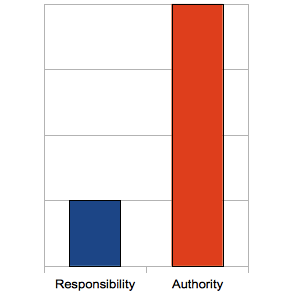
Low Responsibility / High Authority
Leading up to this last week’s post on the Responsibility/Authority Ratio, I was challenged to think about a special (and unlikely) case of responsibility/authority imbalance: high authority and low responsibility.
I agree with @IAmRoot that few would admit to being in this situation. It’s tantamount to being overpaid and under-worked. But what would it look like?
Busybody
I think a busybody might look like this. Lot’s of (self-given) authority and little responsibility to deliver much. The result could be meddling and putting one’s nose where it doesn’t belong.
I’m not certain how this situation could be improved: reduce authority to match the responsibility and there would be legitimate reasons for resentment. If responsibility increases at the right rate though, the employee might be transformed into a valuable (i.e., producing) worker.
Tyrant
With lots of authority and little domain in which to exercise it, a tyrant might also develop. My feeling is that this one would respond best to an increase in responsibility.
A good resource (one worth keeping) would grow and deliver. Another possible response might be resentment: “how dare you ask me to deliver/produce something!” Selling this type on the benefits of increased responsibility is critical.
Melancholy
A hitherto hard-working employee whose responsibility is greatly reduced might fall into some form of depression. At least until the initial shock wears off.
This example is probably the most easily self-fixed. A “hitherto hardworking employee” will quickly determine ways to creatively expand responsibility, volunteer for things and create ways to contribute.
Slacker
I’m a firm believer in having slack, but I can’t justify a slacker. Here I’m defining a slacker as anyone who can produce more, has produced more, has figured out what the expectation is and has chosen to under-deliver.
If you as the manager helped create the situation (or allowed it to happen), then you bear additional responsibility for sorting it out. If you inherited it, you might have a slightly easier time resolving it. In either event, it’s the manager’s job to bring the situation to the worker’s attention, set appropriate expectations and schedule times to check-in on progress. It might also be valuable to have the worker take the lead in proposing solutions, a time-line and in scheduling follow-up.
Synopsis
I think @IAmRoot is right that few would admit to being in this situation. Once identified, resolving the situation becomes important.
How it gets resolved depends largely on how the situation developed in the first place. Taking the time to figure that out can greatly increase your chances of succeeding at raising the level of responsibility to the appropriate level.
What do you think? Can you come up with any other ways that a person in this situation might respond?


I like your analysis! Pretty much what I had in mind. 🙂
@Roger- Thanks for your tweet getting me thinking about what this would look like in practice.
Not very pleasant but I think it bears thinking about some more and this posting is the result.